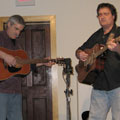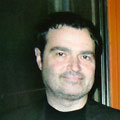The Truth Lies in Darkness
By Chloe Campbell
November 2008
Many aspects of Edmond Rostand’s play Cyrano de Bergerac, change drastically from Acts One and Two to Acts Three through Five. One of the more subtle, but equally drastic elements that undergo change during the course of the play is Cyrano’s use of and behavior in darkness. Darkness includes the absence of light or any type of concealment that Cyrano uses to hide himself. Darkness begins as a theatrical element that Cyrano uses to create his dramatic scenes of sword fighting or verbal battling. It gradually begins to mean much more to the character of Cyrano than its use as a prop. In Acts Three through Five, darkness becomes the only place that Cyrano is willing to reveal his true feelings to Roxanne.
Cyrano is fittingly introduced to the audience in a state of concealment. On page twenty-six, he is listed as “A VOICE.” He uses this air of mystery to his advantage in creating a dramatic scene between himself and Montfleury. He remains hidden to keep the audience guessing the speaker’s identity and to make his entrance all the more exciting. By the end of the play, the audience knows that Cyrano does not value his physical appearance, so his constant reliance on intellectual prowess makes sense. But while reading Scene One of Act One, it is evident that Cyrano is only using concealment as a theatrical tactic. In the same way, he leads his witnesses off stage “forward into the night…in the dim glow of candles” (stage direction 1.7.57). The ensuing swordfight between a dozen men to one man could not be more exciting for the witnesses, but a nighttime swordfight lit by candles and lanterns may be. Cyrano even acknowledges the theatrical qualities of the scene: “You’ll form a gay, charming troupe that will add a note of Italian farce to this Spanish drama…” (1.7.56). Darkness and concealment have lighter meaning in Acts One and Two. Cyrano has control over them and uses them for a purpose.
However, beginning with Act Three, the darkness begins to control Cyrano. In Act Three, Roxane’s Kiss is a transition point in the play that portrays both aspects of Cyrano’s relationship with darkness. To disguise his identity from de Guiche, Cyrano “pushes his hat down over his eyes, takes off his sword, wraps his cloak around himself…” (stage directions 3.12.138). He can easily act out any part with a simple disguise. The scene where Cyrano hides under the balcony talking to Roxane is not so lighthearted though. The audience can see now that Cyrano can only express his true soul when he is concealed in the dark: “Yes, quite different, because in the protecting darkness I dare at last to be myself…” (3.7.127). Cyrano did not plan this darkness or use it when he felt like it; he needed this darkness to speak truthfully to Roxane.
In Acts Four and Five, Cyrano’s aversion to light when he is writing to or speaking passionately to Roxane becomes even more obvious. He writes to her twice a day, but only in the tent. Before dawn is the safest time to deliver the letters, but it is also not an accident that he handles them—the voice of his true feelings—before light falls on them. When Cyrano visits Roxane at the convent, he “bows his head” (stage direction 5.5.216) to avoid her eyes as he reads the last letter that he wrote to her. Ironically, she asks him, “How can you read now? It’s dark”(5.5.216). That is precisely the reason he can read to her: It is dark, she can barely see him, and he can barely see her. Furthermore, she actually recognizes him in his true form during this darkness. She is familiar with his voice—the voice she heard from the balcony. She can be introduced to the true Cyrano now. His physicality is out of her line of sight; they both can focus on the beauty of his words. The darkness here is a sad darkness, not a prop to make Cyrano’s panache even more exciting. This darkness shows Cyrano’s weakness: his low self-esteem. In reality, the darkness in which Cyrano envelopes himself reveals more about him than it conceals.
Cyrano explains his relationship with darkness in the clearest terms in Act Five Scene Six: “Do you remember the evening when Christian spoke to you below your balcony? Well, that evening was the essence of my life: while I remained below, in the shadows, others climbed up to receive the kiss of glory” (220). Cyrano does not search for glory. Unfortunately, some of his best work is created in the darkness, and it stays there. Cyrano expresses his plight further in the dramatic scene of his death: “…here lies Savinien de Cyrano de Bergerac, who was everything, and who was nothing” (5.6.222). He is “everything” but no one can attach a physical presence to Cyano’s poetry, plays, or speeches that come from his heart. If they can attach a face to his work, that person is usually not Cyrano. It is the handsome Christian or the genius Moliere.
Technically, Cyrano has been in a type of concealment from Roxanne for the majority of the play. He hides behind Christian, shielding himself from rejection, while aiding Christian in his quest for love. In the early acts, Cyrano controls the continuous drama, amusing himself and letting out some of his feelings of love for Roxanne. However, the mask of Christian affects Cyrano like an addictive drug. He cannot let go of the façade because then he would not be able to express himself to Roxanne. Sadly, he is willing to settle for knowing the fact that Roxanne loves his words through Christian. In Act Three, he tells her: “How gladly I would give my happiness for the sake of yours, even without your knowledge […] Do you feel my soul rising to you in the darkness?” (3.7.129). Cyrano’s self-image is filled with the darkness with which he surrounds himself. He will not let the light shine on him for fear that Roxanne will be disgusted by his nose. He lets go of this fear only in death because even if she rejects him, he will not be there to endure the pain.
Cyrano de Bergerac knows how to please a crowd. He is even happy with someone else pleasing a crowd with Cyrano’s material. Cyrano frequently utilizes darkness and concealment to aid him in his theatrics and trickery. Shadow allowed him to be whomever he wanted. However, when he becomes entangled with Roxanne and Christian, his relationship with darkness becomes more twisted. He depends upon the darkness to conceal him, so he can talk to Roxanne in the way that he would never have the courage to talk to her in the light. As the play sinks into darkness and Fall, Cyrano becomes enveloped in his love for Roxanne but remains in the shadows, unable to reveal himself to her truthfully. Only in the final darkness that all humans experience is he able to tell her how he truly feels.






